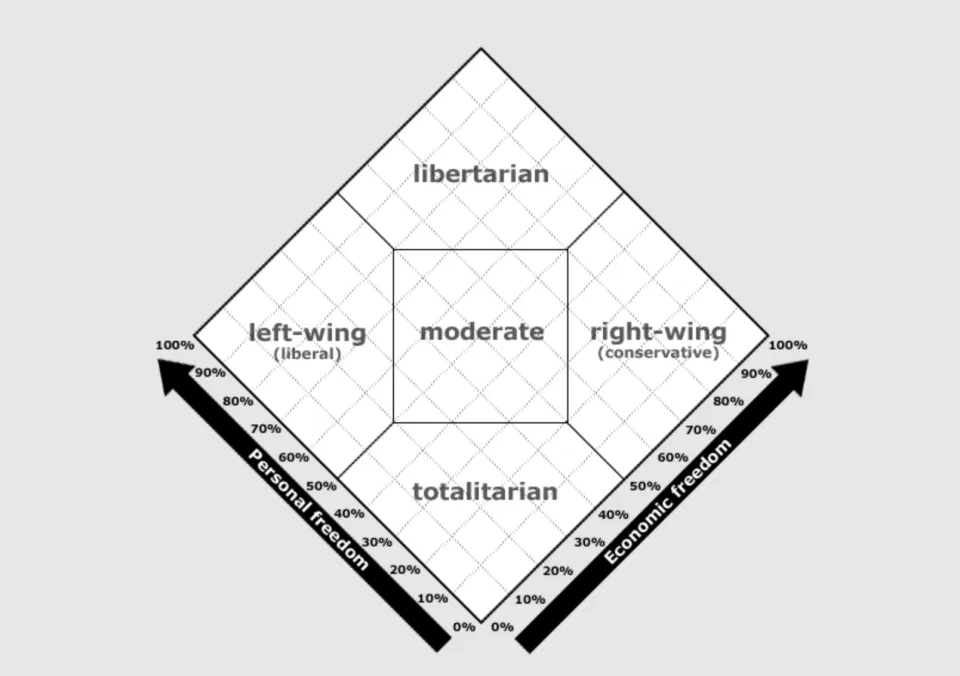State Capitalism | 8values Interpretation of ideological ideology of political tests
Explore the definition, history, operating mechanism of State Capitalism, its diverse forms and far-reaching impact in the global economy. Understand how the state shapes economic development through ownership, policy and market interventions and how it differs from traditional capitalism and planned economies. With the 8 values political test, you can have a deeper understanding of your position in this complex ideological lineage.
What is state capitalism? State Capitalism is a complex economic system that combines capitalist market mechanisms with significant control or ownership of the economy by the government. This concept has attracted widespread attention in the global economy, especially in the context of the rise of emerging markets. However, there are significant differences in the definition of “state capitalism”, which different scholars and research institutions have interpreted from multiple perspectives, making it a term with rich connotation. This article will give a comprehensive and in-depth look at all aspects of state capitalism, including its definition, historical evolution, core characteristics, theoretical basis, diversified manifestations, and the challenges and impacts it brings in global development.
The essential definition and core characteristics of state capitalism
Broadly speaking, State Capitalism refers to the economic system in which the state directly engages in commercial and for-profit economic activities . Under this model, means of production are often nationalized, manifested as control of the processes of capital accumulation, centralized management and employment by state-owned enterprises (SOEs). The state plays a role in the economy like a large corporation, extracting surplus value from the labor force and reinvesting it to promote future production.
The core characteristics of state capitalism include:
- State controls means of production : The state realizes control of key means of production by directly managing state-owned enterprises or holding majority equity in listed companies.
- Pursuing profit and strategic goals : Similar to traditional capitalism, state capitalism pursues economic interests, but its ultimate motivation is often political, that is, maximizing the survival opportunities of state power and leadership rather than simply economic growth. Economic development can be a means to achieve political survival here.
- Lead business activities : The state plays a central role in business activities, including controlling key strategic industries (such as energy, transportation, telecommunications), providing credit or contracts to support specific businesses, and investing through sovereign wealth funds.
- Utilizing market mechanism : State capitalist countries do not completely abandon the market, but use the market to create wealth and distribute it according to the wishes of political officials. In some cases, the state will even promote the capacity and development of new companies through policy support.
Unlike the "pure" capitalist economy advocated by Adam Smith, where the state plays a limited role in the economy, under the state capitalist model, the state plays a more active role in economic activities.
Historical evolution and diverse perspectives of state capitalism
The word "state capitalism" is not a new thing. Discussions about "socialism" and "state capitalism" appeared long before and after the founding of the Soviet Union.
- Early Concepts and Criticism : Frederick Pollock used “state capitalism” to analyze countries such as Nazi Germany in 1941, which coordinated economic production and distribution through direct government control rather than markets, and national priorities were determined by powerful interest groups such as ruling party officials, senior business leaders, bureaucrats and military officials. Friedrich Engels once discussed that state ownership itself cannot eliminate capitalism, but is the final stage of capitalism, manifested in the ownership and management of large-scale production and communications by the bourgeois state. Lenin also regarded state capitalism as a necessary temporary compromise in the early 20th century, aiming to rebuild the economy with capitalist methods under state control and prepare for the transition to comprehensive socialism.
- Marxist Perspective : Many Marxist critics, including anarchists, left-wing communists and Trotskyists, believe that the former Soviet Union and certain historical socialist economies were examples of state capitalism. They believe that although the state owns the means of production, it essentially retains the capitalist production relations and profit-driven, that workers do not really control the means of production, and exploitation and class hierarchy still exist.
- Modern evolution and emerging markets : After the 2008 global financial crisis, the rise of emerging market companies (for example, companies from Brazil, India and other countries) has once again attracted widespread attention. However, there are still significant differences in the definition of the term, and scholars have tried to distinguish and conceptualize similarities and differences by reviewing the use of different authors.
The dimensions and methods of state intervention: the operating mechanism of state capitalism
The purpose of state capitalism is multidimensional and not limited to economic outcomes. In addition to pursuing better socio-economic outcomes, it may also include the personal interests and/or social legitimacy of the ruling party and its senior officials. In some cases, economic development itself becomes a means of political survival. Drivers of state intervention may also include ideology (e.g., a commitment to a strong military out of nationalism) or rent-seeking (e.g., outsourcing public goods or services to private businesses closely related to the government).
To achieve these goals, political elites will intervene in a variety of means or dimensions:
- Corporate ownership : This is one of the most common dimensions of state capitalism, including those that are wholly owned, controlled or held in the state. For example, Musacchio et al. (2015) divided state capitalism into three types according to the proportion of state holdings: fully state-owned enterprises, state-controlled enterprises and state-minor-owned enterprises.
- Policy and Contract Impact : The state can influence certain favored private enterprises by providing credit, signing contracts, or implementing specific policies. For example, the concept of "New Statism" states that states delegate some of the activities traditionally undertaken by themselves to private companies, but retains the ability to support these companies.
- Interactive network between state and enterprise : the nature and purpose of the relationship between state officials and business representatives is another important multidimensional feature of state capitalism. Such connections can affect the performance of a company, for example, in “politicized capitalism”, corporate performance depends not only on the market, but also on its connection with state officials and the scope and quality of government participation in the company. In addition, the relative influence of corporate leaders and states in the formulation of economic priorities also constitutes different types of state capitalism, such as the "state-led" system and the "co-governance" system of state and enterprises.
Theoretical foundations that support state capitalism
Analysis of state capitalism is based on a variety of theoretical frameworks:
- Transaction Cost Economics and Agency Theory : These methods generally assume that individual behavior is selfish and opportunistic, information asymmetry and finite rationality are ubiquitous. From this perspective, state intervention in the economy, especially through state-owned enterprises, may have a negative impact on the company's financial performance, resulting in inefficient resource allocation. Reasons include the possibility that states may force companies to pursue social or economic development goals (such as minimizing unemployment, investing in remote areas, etc.) rather than maximizing profits, and the possibility that states may select senior managers based on political relations rather than management skills, resulting in nepotism or rent-seeking.
- Resource Dependence Theory : This theory emphasizes how organizations rely on other organizations, including states, to obtain the critical inputs required for the production process, thereby establishing power-based relationships and interdependence among organizations.
- Institutional Theory and Economic Sociology : Unlike transaction cost approaches, these approaches believe that the state is not a unified actor, but a network of state and sub-state actors and domestic business alliances whose members may have competitive and overlapping interests. This perspective emphasizes the social construction between states and enterprises, believing that they are not completely separated, but are intertwined or formed by each other. For example, a former government official may become a business executive, or a business interest can influence a country's economic goals and policies. This perspective focuses more on explaining the status quo and changes than on proposals to change the state's capitalist economy.
These different theoretical perspectives lead to research analysis priorities, conceptualization of country-business interactions, and differences in policy recommendations.
Types of State Capitalism and Global Practice Cases
There are many forms of state capitalism, and its definition dimensions are also diverse. The Weber-style “ideal type” aims to propose an inherently coherent and logically consistent model to highlight the unique characteristics of economies that are the main drivers of economic development and in many ways replace markets, private enterprises and individual roles.
- Sectoral Difference : The role of a state in the economy varies by industry. For example, although the United States is classified as a "free market economy", the country plays a wide promotion and support role in innovation-driven technology fields (such as aerospace, laser, nuclear technology, Internet architecture).
- Global Practice Cases :
- Emerging Economies : Many analysts believe that emerging market countries are one of the main cases of state capitalism in the 21st century. These national governments own and control many large enterprises, especially in strategic sectors such as energy, telecommunications, finance and transportation.
- Russia : The Russian government has significant control over major natural resource companies and strategic industries such as oil, gas and defense.
- Singapore : The Singapore government holds shares in key companies through sovereign wealth funds and government affiliates, actively manages assets to support economic development.
- Gulf countries : Governments of Gulf countries such as Saudi Arabia and the United Arab Emirates own and manage large enterprises, especially in the oil and gas sectors, and reinvest the revenue generated to diversify the economy.
- South Korea : In the 1960s, the South Korean military regime achieved rapid development in industries such as steel, cement, shipbuilding and machinery by funding exporters, raising import tariffs, controlling wages, and directing capital to specific chaebols (coordinating industrial complexes).
- Norway : Considered one of the successful national capitalist economies globally, the government holds a large number of corporate shares through sovereign wealth funds, effectively managing state resources to achieve economic goals.
- Elements of state capitalism in developed economies : Even in countries that are considered free market economies, such as the United States and the United Kingdom, there may be strong elements of state capitalism. For example, governments support private production through public funds, but profits are acquired by private owners, which is contrary to the ideal of laissez-faire capitalism.
State capitalism is very effective in promoting rapid modernization in many countries, but historically it has ultimately failed as a “permanent” model of production.
The difference between state capitalism and socialism
Understanding state capitalism requires distinction between it and socialism, although both involve state intervention in the economy.
- Socialism : Its core idea is that means of production (such as factories and land) should be collectively owned by society, and ownership is usually exercised through the state on behalf of the people. The goal is to eliminate class differentiation, and production aims to meet human needs rather than make profits. Government officials decide what to produce based on social needs rather than market needs, ensuring that basic goods and services are available to everyone through adjustments to prices and distributions.
- State Capitalism : Under this system, the state owns and controls enterprises, but operates on capitalist principles and focuses on profit maximization . The state plays a leading role in the market, participates in competition and aims to create profits, while social considerations take a back seat. It retains the characteristics of capitalism, such as profit motivation, market competition, and wage labor.
Therefore, although state capitalism and communism have some historical connections, they differ in their fundamental purpose. Communism aims to completely abolish capitalism and private ownership to create a classless society, while state capitalism uses state ownership within the framework of capitalism to pursue political or economic goals without abolishing the capitalist structure.
Challenges and far-reaching impacts of state capitalism
State capitalism is not without criticism, it brings a series of challenges and far-reaching implications:
- Efficiency and corruption : Critics argue that state capitalism may lead to inefficiency and corruption because state-owned enterprises may not be as efficient as private enterprises and government officials are more susceptible to corruption and nepotism. The multiple goals of state-owned enterprises (such as social goals and profit goals) may reduce their profitability.
- Economic power concentration : Economic power is concentrated in the hands of the government and may limit citizens' ability to start their own businesses and pursue economic goals.
- Rent-seeking behavior : There is a risk of "regulatory capture", that is, private interest groups obtain state resources for self-interest through their relationship with the state.
- Potential erosion of democratic freedom : One concern is that state control over the economy may lead to state control over politics, thereby weakening democratic freedom.
- Geopolitical impact : State capitalism is closely linked to the state's strategy of pursuing international status, and governments use their successful enterprises ("national champion companies") to conduct overseas mergers and acquisitions to enhance their influence in various industries around the world. This also leads to an increase in investment review regulation, as state capital is often seen as politically risky.
- Anxiety and Adjustment in Global Development : The persistent existence and rise of state capitalism has forced international development institutions (such as the World Bank and the International Monetary Fund) to adjust their policy propositions and recognize the legitimacy of state ownership and industrial policies in order to maintain their authority and relevance in the field of development.
- Climate change and ecological transformation : Climate change and ecological crises may further promote the development of state capitalism, as governments may need to increase intervention to accelerate green transformation, but may also exacerbate the contradiction between state capitalism in the energy model of “old world” and “new world”.
Conclusion: Understanding complex and changeable state capitalism
State capitalism is a dynamic and multi-faceted concept that covers the various roles the state plays in the economy, from limited regulators to dominant owners and investors. By deeply analyzing its historical origins, multidimensional characteristics and theoretical basis, we can better understand the diversified practices of this economic model on a global scale and its complex impact on politics, economy and society. It is not only different from pure free market capitalism, but also fundamentally different from socialism in the traditional sense, and appears in a unique way in different countries and historical periods.
In today's world, the form of state capitalism is still evolving, and its role in reshaping the global economic order cannot be ignored. We need to continue to observe and analyze this complex political and economic phenomenon in depth and think about its direction in future development.
By participating in the 8values political orientation test , you can not only understand your views on the role of the state in the economy, but also explore other political ideologies , thereby deepening your understanding of your own political stance. Also, follow our official blog for more in-depth discussions and latest insights on political and philosophical topics.






